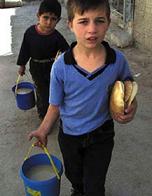
The UN Food and Agriculture Organization (FAO) in cooperation with World Food Programme (WFP) and the United Nations Relief and Works Agency (UNRWA) recently released a report on its assessment of the food and nutrition situation in the West Bank and Gaza.
The report made it clear that the food security situation in the territories had considerably deteriorated over the past three years, with rising unemployment and increasing poverty levels eroding the ability of the 3.5 million Palestinians in the area to buy enough food. The report classified 40 percent of the Palestinian population - 1.4 million people - as food insecure and another 30 percent – 1.1 million people - as threatened with the same fate if the prevalent conditions are to continue.
Distressing as this news is, it comes more to confirm what has already been widely registered than as a shock. The report follows earlier warnings, made most notably by the UN Special Rapporteur on the Right to Food, Mr. Jean Ziegler, who in July 2003 warned that the occupied Palestinian territories were on the verge of a humanitarian catastrophe, as a the result of the extremely harsh military measures imposed by the occupying Israeli military forces since the resurgence of hostilities in September 2000.
Israeli curfews, closures and other similar Israeli policies were again the major reason for the extended humanitarian crisis. While other reasons such as high unemployment, depletion of resources, exhaustion of coping strategies and strained social support networks were also listed, they are much the result of the same severe restrictions.
While many international agencies such as the WFP carry out appreciated assistance, their work, without genuine political developments, will only be able to ultimately retard a humanitarian catastrophe.
The issue of access that the report identified so clearly as the major obstacle to the alleviation of this dire situation is a political issue, determined by a deliberate but sightless Israeli policy to break the Palestinian resilience, a resilience that has so far been the Palestinian backbone in its opposition to the Israeli occupation.
While U.S. and Israeli envoys are shuttling across the ocean, in an effort to finalize Sharon’s disengagement plan, the core of the situation will as always be evaded. Israel’s proposed unilateral withdrawal from Gaza is gradually being heralded as a footstep for the re-engagement of the ‘road map’, a map that has so far only led to sustain Palestinian suffering. A withdrawal from Gaza would seem to be a move in the right direction, in principal, and would allow the devastating situation in Gaza to be improved, but the actual implementation and the form it will take has yet to be seen before embracing these hopes.
Fears that the withdrawal from Gaza will come at the price of relinquishing the same expectations in the West Bank are growing, and Israeli policy on the ground cannot be said to dismiss those suspicions.
The achievement of an Israeli withdrawal from Gaza will undoubtedly serve President Bush in his election campaign; Palestinians in the West Bank however might not be served and will most likely remain under the mercy of ongoing Israeli unilateral policies.
The report will surely raise the human dimension of the plight of the Palestinian people, which is too often overshadowed by the political commotion, for some people, though politicians will predictably remain immune.
Will another high profile agency have to report of even graver circumstances next year? The deficiency of food security in the Palestinian occupied territories is another cynical example of the deficiency of real political will by the US and others in the international community to scrutinize Israel’s occupation politics.
Political rhetoric and bankrupt international commotion can only lead to evermore growing volumes of reports depicting a humanitarian catastrophe in the making.







